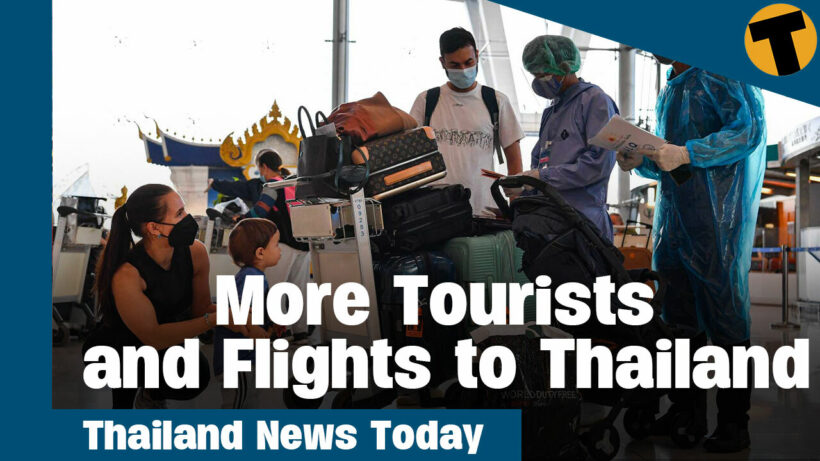Thailand News Today | Thailand enjoys an increase in tourists and flights

Since the government eliminated the Thailand Pass, flights and passengers have since increased at Bangkok’s Suvarnabhumi Airport by about 10% on average.
July 1 saw the lifting of travel restrictions, including the need to apply in advance for a Thailand Pass, which the government touted as opening the floodgates to a surge of international travellers, predicting 3 and a half times the arrivals in the last 6 months of 2022 compared to the same period last year.
So far Suvarnabhumi Airport has seen a slight increase in air traffic for the first 3 days of the month. Travel in June had averaged 130 flights per day landing at Bangkok’s main airport, by far the busiest in Thailand, with between 23,000 and 24,000 travellers per day.
The figures were shared today by Deputy Government Spokesperson Traisulee Traisaranakul who said the numbers in July so far were on track with the predictions made by the Ministry of Tourism and Sports. The ministry says that the daily arrivals should pass the 30,000 per day mark very soon, and estimate that the arrivals should double to 60,000 in October.
—————
The Permanent Secretary of the Thai Public Health Ministry, Kiattiphum Wongarajit, has launched an urgent report to warn the provincial public health officers of a “new wave” of Covid in Thailand.
The official Facebook page of the Rural Doctor Society reported on their “urgent document” to the public yesterday.
In the document, the Ministry of Public health urges provincial health officers in every province to prepare according to 8 guidelines…
First, inform every medical worker about the increasing numbers of Covid patients.
Second, prepare medicines and Covid prevention equipment.
Third, prepare hospital beds for patients, especially those with critical symptoms.
Forth, prepare a transferring process in case patients need specific treatment from other hospitals.
Fifth, urge medical workers to get a booster dose of a Covid vaccine.
Sixth, inform residents on how to protect themselves from Covid and prevent the spread of the virus.
Seventh, collaborate with relevant departments to create a plan for controlling and preventing the spread of Covid.
Eighth, gather and update all data related to Covid-19 .
———————-
While government figures report around 2,000 new cases of Covid per day, a respiratory disease specialist says that the actual number is hugely underreported.
In a Facebook post, Dr Nithiphat Chiarakun, head of the department of respiratory diseases and tuberculosis of Mahidol University’s Faculty of Medicine estimated that there could be as many as 50,000 new Covid infections every day in Thailand.
The associate professor says that the information he’s receiving puts the daily new infection rate at about 25 times the official reported numbers from the Ministry of Public Health. He says that the situation is quite troublesome, and asks people to be vigilant in the safety measures against Covid-19 despite the fatigue of more than 2 years of what looked to be a waning pandemic.
The doctor fears the underreported spike in new cases could lead to shortages of medical personnel as well as hospital beds like we saw at the peak of the Covid-19 pandemic.
The main hospitals in Bangkok and around Thailand are already quietly adding more hospital beds in case the spike continues, and workers assigned to Covid patients are doubling their efforts. The doctor said beds that had previously been reserved for Covid patients are now occupied by people with other diseases.
Nithiphat points to the government’s push towards transitioning Covid from a pandemic to an endemic status as the reason for what he claims are artificially low official infection numbers, and points to a reality far grimmer, with limited staff, bedding, and budget available for a potential underreported new wave of severely-infected patients.
———-
In related news, a prominent American economist further fanned the flames of who is to blame for the Covid-19 outbreak by pointing the finger at US scientists, saying it came “out of a US biotech lab.”
There have been a number of conspiracy theories about where the coronavirus outbreak originated and who should shoulder responsibility for the pandemic outbreak.
Both the US and China have accused each other of releasing the virus out of a lab while the World Health Organisation concluded it came from a wet market in Wuhan, China. Although the WHO recently backtracked on that on June 9. It said its latest investigation into the origins of Covid was inconclusive, largely because data from China was missing. Very convenient for a mass surveillance state like China to lose such critical data.
But economist Jeffery Sachs does not agree with the WHO report and he rejects it evolved out of natural circumstances.
The former director of The Earth Institute at Columbia University, speaking at a conference by the Spanish think tank GATE Center, claimed that as he chairs the Covid-19 commission at the medical journal, The Lancet, he had more information on the matter.
“It is a blunder, in my view, of biotech, not an accident of a natural spillover.
“We don’t know for sure, but there was ‘enough evidence’ to posit a further probe into the matter, even though it is not being investigated, not in the United States, not anywhere.”
In May, Sachs, together with Neil Harrison, a professor at Columbia University, published an article that called for “an independent inquiry into the origin of the SARS-CoV-2 virus. It alleged that “that there is much important information that can be gleaned from US-based research institutions, information not yet made available for independent, transparent, and scientific scrutiny.”
On June 10, CBS News reported that the WHO is recommending in its strongest terms yet that a deeper probe is required into whether a lab accident may be to blame.
And so it goes on…
————–
Illicit drugs, valued around 25 billion baht, are set to go up in smoke over the next 2 days. The confiscated drugs, which have been stored in a FDA location, are going to be creating some interesting smoke fumes for people living downwind.
The exotic ingredients include 738 kilograms of heroin, 29 kilograms of opium, 4 kilograms of ecstasy, 23,365 kilograms of methamphetamine pills and 14,482 kilograms of crystal meth. There’s also a range of other psychoactive substances that are going to get the torch over the next few days.
Representatives from the FDA, the Narcotics Control Board, Police, Department of Medical Sciences, the Office of Forensic Science and the Army have all been involved in the inspections leading up to today’s big chemical bonfire.
Spared from the blaze is the newly decriminalised happy plant whose name will get us demonetized on this channel. Apparently Youtube thinks it’s okay for us to say the name of the other drugs, but not this one. Politicians, authorities and police are now trying to reign in the confusion over the announcement to decriminalise the plant in Thailand on June 9. There is currently a bill which will be debated in parliament which will codify the future laws around the happy plant products. The delays between the initial announcement and the passing of laws has created a legal no-man’s land.
Hundreds of shops are springing up, especially around Bangkok, and even online, retailing the plant, leaving police in a legislative twilight zone.
Meanwhile, the Bangkok Metropolitan Administration is rejecting calls from entrepreneurial business owners and vendors to turn Khao San Road into an Asian Amsterdam.
BMA authorities have pointed out that any new laws will be Thailand-wide, and not district-specific. They also pointed out that Khao San Road is amongst a broader community of schools and temples.
Latest Thailand News
Follow The Thaiger on Google News:


























